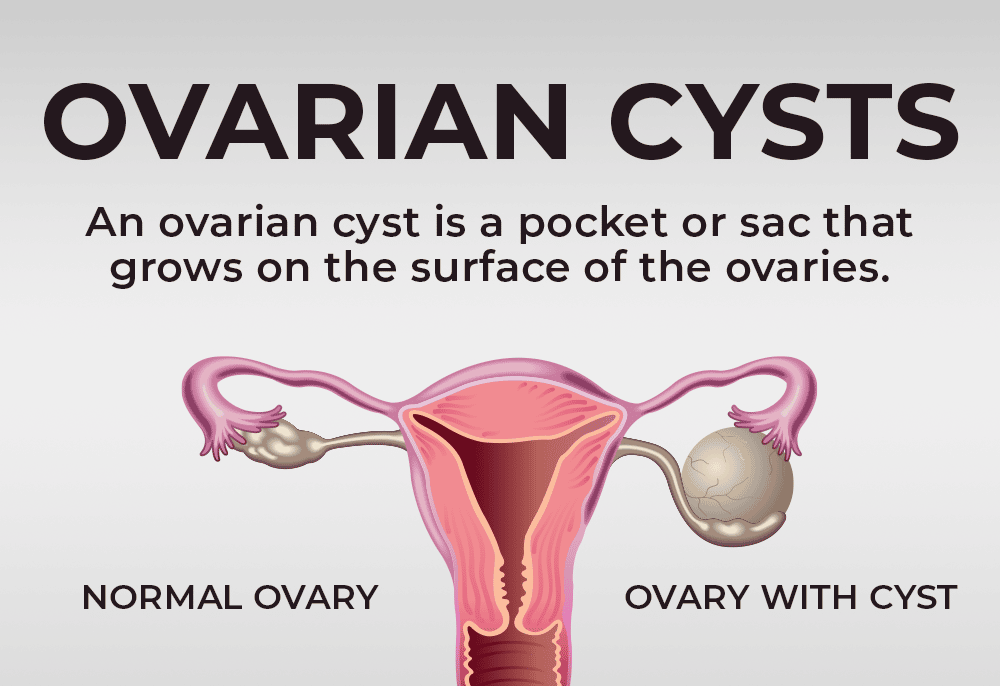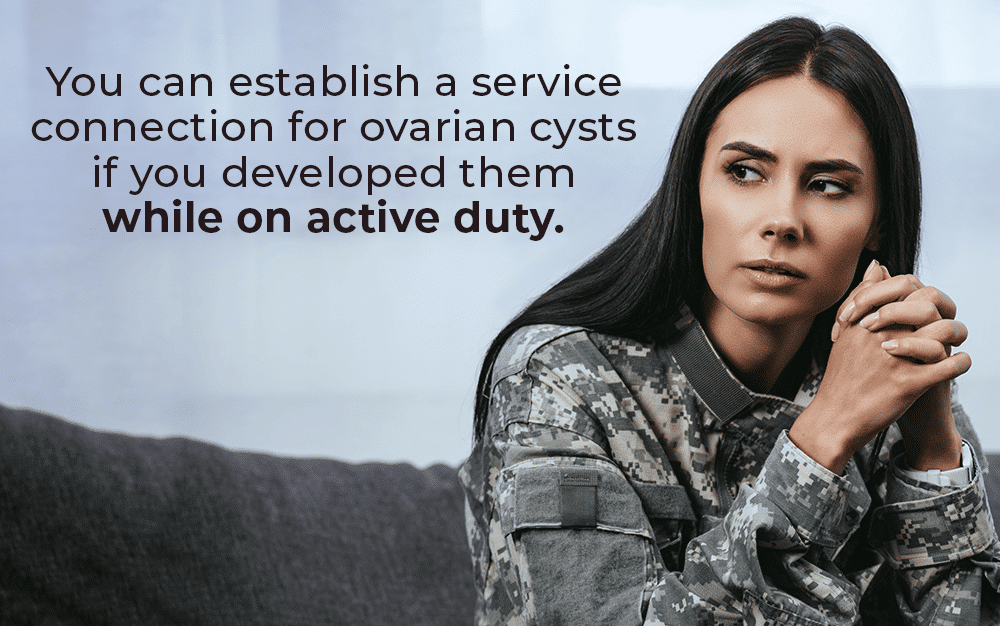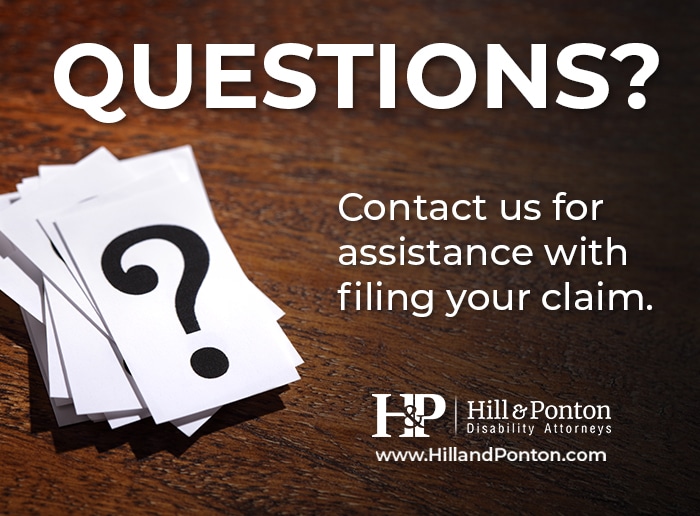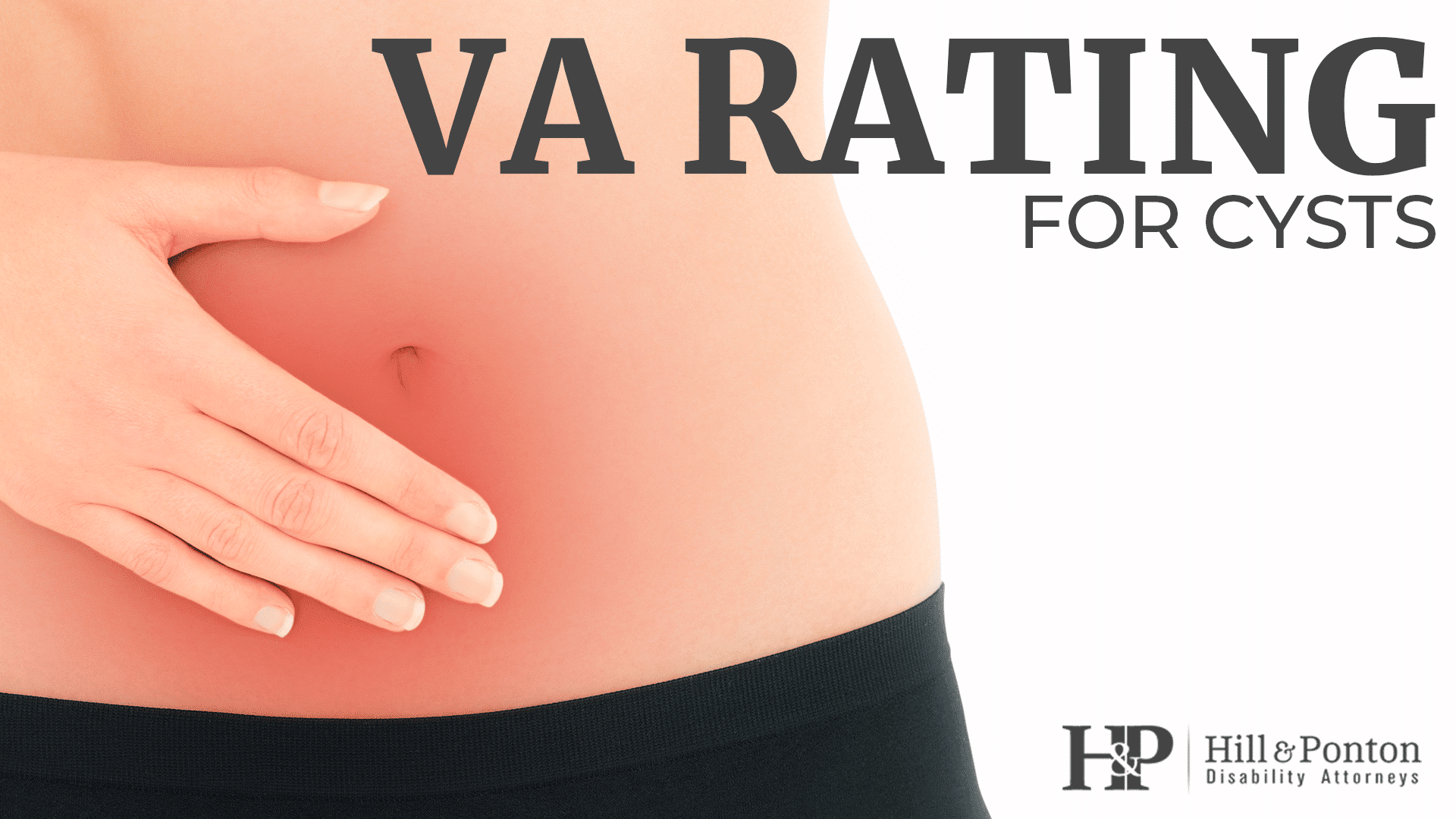An ovarian cyst is a pocket or sac that grows on the surface of the ovaries. Typically, cysts fill with fluid and then disappear without causing any significant impairment. Gynecological problems can develop when the cyst seals at the opening and the sac filled with fluid remains. Cysts can also contain uterine cells and tissue. While these types of cysts are abnormal, they are not cancerous. Here are the most common symptoms associated with uterine cysts:
- Abdominal bloating, pressure, or swelling: Cysts can put pressure on other organs as they grow larger and cause a bulge in the abdomen.
- Generalized pain: You might notice a pulling sensation near your ovaries and the muscles that support ovaries. Depending on the location of the cyst, it can cause back, pelvic, or thigh pain due to extra pressure on the muscles, nerves, or other internal organs.
- Nausea and/or vomiting: Some women with ovarian cysts become nauseous or vomit due to hormonal changes. It is similar to morning sickness in pregnancy.
- Painful intercourse: Cysts may put pressure on the reproductive organs, which can make sex uncomfortable.
- Pain with bowel movements: Pressure on the abdominal or bowel muscles from a cyst can make bowel movements painful.
- Urinary urgency: You may feel like you need to urinate more often or get to the bathroom quickly due a cyst putting pressure on your bladder.

The law firm of Hill & Ponton works exclusively with veterans to help them claim disability benefits related to a medical condition they developed or one that worsened while on active duty. We highly recommend contacting us before submitting your disability claim or undergoing a disability evaluation to ensure you have the best chance of receiving VA disability payments.
Service Connection for Cysts
You can establish a service connection for ovarian cysts if you developed them while on active duty. If you received a misdiagnosis such as premenstrual syndrome when you actually had cysts, you can file for disability benefits through the Department of Veterans Affairs (VA) even after you leave active duty military service. You need to meet all three of these criteria to establish a service connection for uterine cysts:
- A diagnostic code noted in your medical records that supports the diagnosis of ovarian cysts.
- Description of one or more incidents during your active duty military service that caused you to develop ovarian cysts or made the gynecological problem worse if you already had it.
- A medical nexus that connects the current disability of ovarian cysts with a specific aspect of your military service. For example, if the stress of your military assignment caused a medical condition such as endometriosis, hormonal imbalance, or pelvic infection to become worse and you developed a cyst, you should be able to make a positive service connection. Another possibility is that wearing your military uniform caused discomfort that placed added stress on your abdomen and a worsening of your gynecological condition.

Secondary Service Connection for Cysts
The VA considers any disability caused by the main condition for which you filed a disability claim as a secondary service connection. An ovarian cyst that ruptures, for example, can cause an infection due to internal bleeding. You may be eligible for additional disability compensation if you can prove a service connection from cysts and that a secondary medical condition developed because of the cysts. Both medical conditions would require verification from a doctor.
Compensation & Pension (C & P) Exams for Cysts
The VA does not require every claimant to undergo a medical evaluation. You will get a letter from the Department of Veterans Affairs if the agency requires a medical examination report to make a decision on your disability claim. The VA examination also helps to determine your disability rating should the VA approve your claim. This typically occurs when the VA feels that your medical records do not provide enough information to support a disabling condition.
A VA examination differs from a typical doctor appointment in that it is for rating purposes only. The healthcare provider will not offer a diagnosis or arrange any follow-up care. Here is a general idea of what you can expect during your VA examination:
- Review your disability claim and medical records and ask clarifying questions if necessary. The doctor conducting the VA examination may base questions off the Disability Benefits Questionnaire for each disabling condition you listed on your claim.
- Because your disability claim is for ovarian cysts, the doctor will complete a gynecological exam that may include checking for adhesions, fallopian tube defects, neoplasms, nodules, or other symptoms related to ovarian cysts. You may need lab work or X-rays to confirm the doctor’s findings from your VA examination.
After reviewing your medical records and completing the VA examination, the doctor will provide either a favorable or unfavorable recommendation. A favorable recommendation means that he or she agrees that your cysts have a proven service connection.
If you receive an unfavorable recommendation, it likely means that you provided incomplete medical records or the doctor simply did not know enough about gynecological medical conditions to rule in your favor. You are free to seek a second opinion. We also recommend that you contact a disability rights attorney from Hill & Ponton for legal representation if you did not do so earlier in the process.

How Does VA Rate Cysts?
The VA rating for cysts is straightforward compared to related diseases of the female reproductive system. If you have ovarian cysts but do not require treatment for them, the VA assigns a disability rating of 0 percent. Your disability rating is 10 percent if you required treatment for cysts at one time but do not need continuous treatment for this common gynecological medical condition. You will receive a higher rating of 30 percent if your cysts have produced symptoms that you cannot control with medication or lifestyle changes.
An important distinction with disability ratings and ovarian cysts is that the VA does not consider whether you continue to develop cysts, only if the cysts continue to cause symptoms. That means you could have ongoing asymptomatic cysts and receive a 0 percent disability rating.
The VA also offers special monthly compensation above the usual entitlement for veterans who experience the functional loss of an organ or body part. In the case of ovarian cysts, you could be eligible for special monthly compensation if the cyst causes your ovary to become non-functional or you later need a hysterectomy to remove one or both ovaries due to issues caused by cysts.

Contact Us Today or Complete an Online Case Evaluation
The attorneys at Hill & Ponton have helped secure VA benefits for sick and injured military service members and veterans for the past 30 years. We have secured VA benefits worth over $300 million dollars for our clients. Could you have a valid disability claim for ovarian cysts? Find out today by completing this free online case evaluation or by calling Hill & Ponton at 1-888-373-9436.




